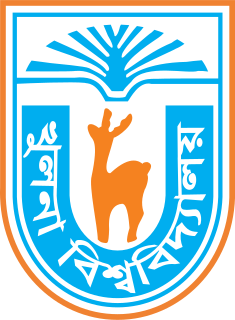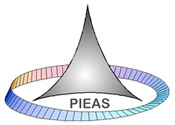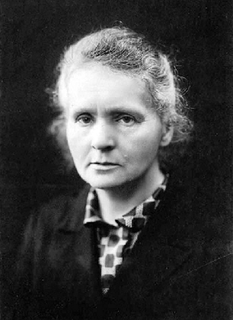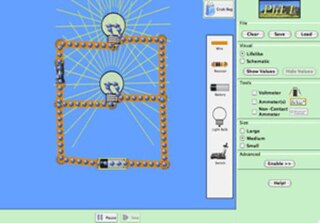Related Research Articles

A chemist is a scientist trained in the study of chemistry. Chemists study the composition of matter and its properties. Chemists carefully describe the properties they study in terms of quantities, with detail on the level of molecules and their component atoms. Chemists carefully measure substance proportions, chemical reaction rates, and other chemical properties. In Commonwealth English, pharmacists are often called chemists.

Frederick Soddy FRS was an English radiochemist who explained, with Ernest Rutherford, that radioactivity is due to the transmutation of elements, now known to involve nuclear reactions. He also proved the existence of isotopes of certain radioactive elements. He was a polymath who mastered chemistry, statistical mechanics, finance and economics.
Information science is an academic field which is primarily concerned with analysis, collection, classification, manipulation, storage, retrieval, movement, dissemination, and protection of information. Practitioners within and outside the field study the application and the usage of knowledge in organizations in addition to the interaction between people, organizations, and any existing information systems with the aim of creating, replacing, improving, or understanding information systems. Historically, information science is associated with computer science, data science, psychology, technology, and intelligence agencies. However, information science also incorporates aspects of diverse fields such as archival science, cognitive science, commerce, law, linguistics, museology, management, mathematics, philosophy, public policy, and social sciences.
CiteSeerx is a public search engine and digital library for scientific and academic papers, primarily in the fields of computer and information science. CiteSeer is considered as a predecessor of academic search tools such as Google Scholar and Microsoft Academic Search. CiteSeer-like engines and archives usually only harvest documents from publicly available websites and do not crawl publisher websites. For this reason, authors whose documents are freely available are more likely to be represented in the index.

The Entrez Global Query Cross-Database Search System is a federated search engine, or web portal that allows users to search many discrete health sciences databases at the National Center for Biotechnology Information (NCBI) website. The NCBI is a part of the National Library of Medicine (NLM), which is itself a department of the National Institutes of Health (NIH), which in turn is a part of the United States Department of Health and Human Services. The name "Entrez" was chosen to reflect the spirit of welcoming the public to search the content available from the NLM.

East China University of Science and Technology is a research university located in Shanghai, China. Originally established with a focus on chemical technology, it has evolved into a comprehensive university that covers all academic disciplines and offers a large variety of majors. It is a Chinese Ministry of Education Double First Class Discipline University, with Double First Class status in certain disciplines. The school encompasses two campuses and a science park in the Xuhui, Fengxian and Jinshan districts of Shanghai.

Khulna University is a public university in Bangladesh. It is situated at Gollamari, Khulna, Bangladesh, by the river Moyur, beside the Khulna-Satkhira highway. The academic programs of Khulna University started on 31 August 1991 with 80 students in four disciplines. As of November 2019, the university has 29 disciplines under six schools and two institutes. It is the only public university in Bangladesh where student politics is not allowed.
PubChem is a database of chemical molecules and their activities against biological assays. The system is maintained by the National Center for Biotechnology Information (NCBI), a component of the National Library of Medicine, which is part of the United States National Institutes of Health (NIH). PubChem can be accessed for free through a web user interface. Millions of compound structures and descriptive datasets can be freely downloaded via FTP. PubChem contains multiple substance descriptions and small molecules with fewer than 100 atoms and 1000 bonds. More than 80 database vendors contribute to the growing PubChem database.

Gaziantep University is a public university in Gaziantep, Turkey. Gaziantep University has 10 faculties, containing a total of 22 academic departments, with a strong emphasis on scientific and technological research.
ChemXSeer project, funded by the National Science Foundation, is a public integrated digital library, database, and search engine for scientific papers in chemistry. It is being developed by a multidisciplinary team of researchers at the Pennsylvania State University. ChemXSeer was conceived by Dr. Prasenjit Mitra, Dr. Lee Giles and Dr. Karl Mueller as a way to integrate the chemical scientific literature with experimental, analytical, and simulation data from different types of experimental systems. The goal of the project is to create an intelligent search and database which will provide access to relevant data to a diverse community of users who have a need for chemical information. It is hosted on the World Wide Web at the College of Information Sciences and Technology, The Pennsylvania State University.

Centre for Excellence in Basic Sciences is an autonomous institute with an affiliation to the University of Mumbai. It was set up in the University of Mumbai by the Department of Atomic Energy (DAE) in collaboration with the university. This institute offers undergraduate science education and research opportunities. It aims at improving the quality of basic science education in the country at the undergraduate level and developing a pool of scientists for the various scientific works of the country. The Institute was established on 17 September 2007 by Dr R. Chidambaram, Principal Scientific Advisor to the Government of India. In 2016, the institution was granted the status of "Aided Institution" under the Department of Atomic Energy by the Government of India.
The Faculty Of Science is one of the four faculties which make up the University of Strathclyde, in Glasgow, Scotland. The faculty contains a number of departments offering various undergraduate and postgraduate courses.
The Energy Citations Database (ECD) was created in 2001 in order to make scientific literature citations, and electronic documents, publicly accessible from U.S. Department of Energy (DOE), and its predecessor agencies, at no cost to the user. This database also contains all the unclassified materials from Energy Research Abstracts. Classified materials are not available to the public. ECD does include the unclassified, unlimited distribution scientific and technical reports from the Department of Energy and its predecessor agencies, the Atomic Energy Commission and the Energy Research and Development Administration. The database is usually updated twice per week.
The Energy Science and Technology Database (EDB) is a multidisciplinary file containing worldwide references to basic and applied scientific and technical research literature. The information is collected for use by government managers, researchers at the national laboratories, and other research efforts sponsored by the U.S. Department of Energy, and the results of this research are transferred to the public. Abstracts are included for records from 1976 to the present day.

The Pakistan Institute of Engineering and Applied Sciences (PIEAS), is a public research university located in Islamabad, Pakistan. The university is modelled on international standards with a strong focus on the scientific advancement of the nuclear science-related STEM fields and medical sciences.
There is one nuclear reactor in Ghana, the Ghana Research Reactor, located in Accra. In operation since 1994, it is used for research, medical, and industrial purposes, but not for generating electricity.
The Institute of Space and Planetary Astrophysics, also known as by its abbreviation ISPA, is a premier and national research institute of the University of Karachi, engaging the theoretical and applied studies and research into topics pertaining to Astronomy, Astrophysics, Satellite Communication, Space Flight Dynamics, Atmospheric Science, Climatology, GIS & Remote Sensing and other related subjects. The institute has network of various mathematics and physics laboratories located in various universities of Pakistan, while it operates a single Karachi University Astrophysics Observatory.

Chemistry and physics are branches of science that both study matter. The difference between the two lies in their scope and approach. Chemists and physicists are trained differently, and they have different professional roles, even when working in a team. The division between chemistry and physics becomes diffuse at the interface of the two branches, notably in fields such as physical chemistry, chemical physics, quantum mechanics, nuclear physics/chemistry, materials science, spectroscopy, solid state physics, solid-state chemistry, crystallography, and nanotechnology.
The following outline is provided as an overview of and topical guide to nuclear power:

PhET Interactive Simulations, a project at the University of Colorado Boulder, is a non-profit open educational resource project that creates and hosts explorable explanations. It was founded in 2002 by Nobel Laureate Carl Wieman. PhET began with Wieman's vision to improve the way science is taught and learned. Their stated mission is "To advance science and math literacy and education worldwide through free interactive simulations."
References
- 1 2 Mitch Leslie (2002). "Nuclear stockpile". Science . 297 (5579): 163a. doi: 10.1126/science.297.5579.163a .
- 1 2 3 4 5 6 7 8 9 F. A. Settle; E. R. Blackmer & T. P. Whaley (2008). "The Alsos Digital Library for Nuclear Issues". International Journal of Nuclear Knowledge Management . 3 (1): 37–40. doi:10.1504/IJNKM.2008.018937.
- 1 2 3 Tom P. Whaley; Frank A. Settle & Elizabeth R. Blackmer (2002). "Undergraduate participation in the development of the Alsos Digital Library for Nuclear Issues". Journal of Computing Sciences in Colleges . 18 (2): 131–137.
- 1 2 3 4 5 Frank A. Settle et al.The Alsos Digital Library for Nuclear Issues Accessed 06-11-2009.[ full citation needed ]
- ↑ Frank A. Settle; Tom Whaley & Elizabeth Blackmer (2003). "Alsos Digital Library for Nuclear Issues". Journal of Military History . 67 (3): 921–923. doi:10.1353/jmh.2003.0254. S2CID 159928828.